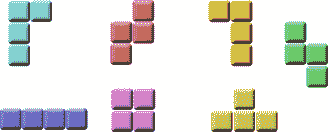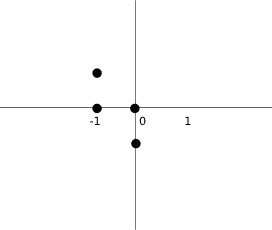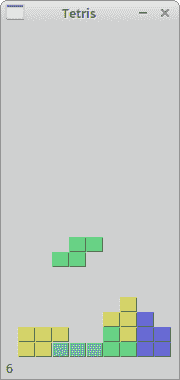俄罗斯方块游戏是有史以来最受欢迎的计算机游戏之一。 原始游戏是由俄罗斯程序员 Alexey Pajitnov 于 1985 年设计和编程的。此后,几乎所有版本的几乎所有计算机平台上都可以使用俄罗斯方块。
俄罗斯方块被称为下降块益智游戏。 在这个游戏中,我们有七个不同的形状,称为 tetrominoes:S 形,Z 形,T 形,L 形,线形,MirroredL 形和方形。 这些形状中的每一个都形成有四个正方形。 形状从板上掉下来。 俄罗斯方块游戏的目的是移动和旋转形状,以使其尽可能地适合。 如果我们设法形成一行,则该行将被破坏并得分。 我们玩俄罗斯方块游戏,直到达到顶峰。

图:Tetrominoes
wxPython 是旨在创建应用的工具包。 还有其他一些旨在创建计算机游戏的库。 不过,可以使用 wxPython 和其他应用工具包来创建游戏。
开发
我们的俄罗斯方块游戏没有图像,我们使用 wxPython 中提供的绘图 API 绘制四方块。 每个计算机游戏的背后都有一个数学模型。 俄罗斯方块也是如此。
游戏背后的一些想法:
- 我们使用
wx.Timer创建游戏周期 - 绘制四方块
- 形状以正方形为单位移动(不是逐个像素移动)
- 从数学上讲,棋盘是简单的数字列表
tetris.py
#!/usr/bin/env python3# -*- coding: utf-8 -*-"""ZetCode wxPython tutorialThis is Tetris game clone in wxPython.author: Jan Bodnarwebsite: www.zetcode.comlast modified: May 2018"""import wximport randomclass Tetris(wx.Frame):def __init__(self, parent):wx.Frame.__init__(self, parent, size=(180, 380),style=wx.DEFAULT_FRAME_STYLE ^ wx.RESIZE_BORDER ^ wx.MAXIMIZE_BOX)self.initFrame()def initFrame(self):self.statusbar = self.CreateStatusBar()self.statusbar.SetStatusText('0')self.board = Board(self)self.board.SetFocus()self.board.start()self.SetTitle("Tetris")self.Centre()class Board(wx.Panel):BoardWidth = 10BoardHeight = 22Speed = 300ID_TIMER = 1def __init__(self, *args, **kw):super(Board, self).__init__(*args, **kw)self.initBoard()def initBoard(self):self.timer = wx.Timer(self, Board.ID_TIMER)self.isWaitingAfterLine = Falseself.curPiece = Shape()self.nextPiece = Shape()self.curX = 0self.curY = 0self.numLinesRemoved = 0self.board = []self.isStarted = Falseself.isPaused = Falseself.Bind(wx.EVT_PAINT, self.OnPaint)self.Bind(wx.EVT_KEY_DOWN, self.OnKeyDown)self.Bind(wx.EVT_TIMER, self.OnTimer, id=Board.ID_TIMER)self.clearBoard()def shapeAt(self, x, y):return self.board[(y * Board.BoardWidth) + x]def setShapeAt(self, x, y, shape):self.board[(y * Board.BoardWidth) + x] = shapedef squareWidth(self):return self.GetClientSize().GetWidth() // Board.BoardWidthdef squareHeight(self):return self.GetClientSize().GetHeight() // Board.BoardHeightdef start(self):if self.isPaused:returnself.isStarted = Trueself.isWaitingAfterLine = Falseself.numLinesRemoved = 0self.clearBoard()self.newPiece()self.timer.Start(Board.Speed)def pause(self):if not self.isStarted:returnself.isPaused = not self.isPausedstatusbar = self.GetParent().statusbarif self.isPaused:self.timer.Stop()statusbar.SetStatusText('paused')else:self.timer.Start(Board.Speed)statusbar.SetStatusText(str(self.numLinesRemoved))self.Refresh()def clearBoard(self):for i in range(Board.BoardHeight * Board.BoardWidth):self.board.append(Tetrominoes.NoShape)def OnPaint(self, event):dc = wx.PaintDC(self)size = self.GetClientSize()boardTop = size.GetHeight() - Board.BoardHeight * self.squareHeight()for i in range(Board.BoardHeight):for j in range(Board.BoardWidth):shape = self.shapeAt(j, Board.BoardHeight - i - 1)if shape != Tetrominoes.NoShape:self.drawSquare(dc,0 + j * self.squareWidth(),boardTop + i * self.squareHeight(), shape)if self.curPiece.shape() != Tetrominoes.NoShape:for i in range(4):x = self.curX + self.curPiece.x(i)y = self.curY - self.curPiece.y(i)self.drawSquare(dc, 0 + x * self.squareWidth(),boardTop + (Board.BoardHeight - y - 1) * self.squareHeight(),self.curPiece.shape())def OnKeyDown(self, event):if not self.isStarted or self.curPiece.shape() == Tetrominoes.NoShape:event.Skip()returnkeycode = event.GetKeyCode()if keycode == ord('P') or keycode == ord('p'):self.pause()returnif self.isPaused:returnelif keycode == wx.WXK_LEFT:self.tryMove(self.curPiece, self.curX - 1, self.curY)elif keycode == wx.WXK_RIGHT:self.tryMove(self.curPiece, self.curX + 1, self.curY)elif keycode == wx.WXK_DOWN:self.tryMove(self.curPiece.rotatedRight(), self.curX, self.curY)elif keycode == wx.WXK_UP:self.tryMove(self.curPiece.rotatedLeft(), self.curX, self.curY)elif keycode == wx.WXK_SPACE:self.dropDown()elif keycode == ord('D') or keycode == ord('d'):self.oneLineDown()else:event.Skip()def OnTimer(self, event):if event.GetId() == Board.ID_TIMER:if self.isWaitingAfterLine:self.isWaitingAfterLine = Falseself.newPiece()else:self.oneLineDown()else:event.Skip()def dropDown(self):newY = self.curYwhile newY > 0:if not self.tryMove(self.curPiece, self.curX, newY - 1):breaknewY -= 1self.pieceDropped()def oneLineDown(self):if not self.tryMove(self.curPiece, self.curX, self.curY - 1):self.pieceDropped()def pieceDropped(self):for i in range(4):x = self.curX + self.curPiece.x(i)y = self.curY - self.curPiece.y(i)self.setShapeAt(x, y, self.curPiece.shape())self.removeFullLines()if not self.isWaitingAfterLine:self.newPiece()def removeFullLines(self):numFullLines = 0statusbar = self.GetParent().statusbarrowsToRemove = []for i in range(Board.BoardHeight):n = 0for j in range(Board.BoardWidth):if not self.shapeAt(j, i) == Tetrominoes.NoShape:n = n + 1if n == 10:rowsToRemove.append(i)rowsToRemove.reverse()for m in rowsToRemove:for k in range(m, Board.BoardHeight):for l in range(Board.BoardWidth):self.setShapeAt(l, k, self.shapeAt(l, k + 1))numFullLines = numFullLines + len(rowsToRemove)if numFullLines > 0:self.numLinesRemoved = self.numLinesRemoved + numFullLinesstatusbar.SetStatusText(str(self.numLinesRemoved))self.isWaitingAfterLine = Trueself.curPiece.setShape(Tetrominoes.NoShape)self.Refresh()def newPiece(self):self.curPiece = self.nextPiecestatusbar = self.GetParent().statusbarself.nextPiece.setRandomShape()self.curX = Board.BoardWidth // 2 + 1self.curY = Board.BoardHeight - 1 + self.curPiece.minY()if not self.tryMove(self.curPiece, self.curX, self.curY):self.curPiece.setShape(Tetrominoes.NoShape)self.timer.Stop()self.isStarted = Falsestatusbar.SetStatusText('Game over')def tryMove(self, newPiece, newX, newY):for i in range(4):x = newX + newPiece.x(i)y = newY - newPiece.y(i)if x < 0 or x >= Board.BoardWidth or y < 0 or y >= Board.BoardHeight:return Falseif self.shapeAt(x, y) != Tetrominoes.NoShape:return Falseself.curPiece = newPieceself.curX = newXself.curY = newYself.Refresh()return Truedef drawSquare(self, dc, x, y, shape):colors = ['#000000', '#CC6666', '#66CC66', '#6666CC','#CCCC66', '#CC66CC', '#66CCCC', '#DAAA00']light = ['#000000', '#F89FAB', '#79FC79', '#7979FC','#FCFC79', '#FC79FC', '#79FCFC', '#FCC600']dark = ['#000000', '#803C3B', '#3B803B', '#3B3B80','#80803B', '#803B80', '#3B8080', '#806200']pen = wx.Pen(light[shape])pen.SetCap(wx.CAP_PROJECTING)dc.SetPen(pen)dc.DrawLine(x, y + self.squareHeight() - 1, x, y)dc.DrawLine(x, y, x + self.squareWidth() - 1, y)darkpen = wx.Pen(dark[shape])darkpen.SetCap(wx.CAP_PROJECTING)dc.SetPen(darkpen)dc.DrawLine(x + 1, y + self.squareHeight() - 1,x + self.squareWidth() - 1, y + self.squareHeight() - 1)dc.DrawLine(x + self.squareWidth() - 1,y + self.squareHeight() - 1, x + self.squareWidth() - 1, y + 1)dc.SetPen(wx.TRANSPARENT_PEN)dc.SetBrush(wx.Brush(colors[shape]))dc.DrawRectangle(x + 1, y + 1, self.squareWidth() - 2,self.squareHeight() - 2)class Tetrominoes(object):NoShape = 0ZShape = 1SShape = 2LineShape = 3TShape = 4SquareShape = 5LShape = 6MirroredLShape = 7class Shape(object):coordsTable = (((0, 0), (0, 0), (0, 0), (0, 0)),((0, -1), (0, 0), (-1, 0), (-1, 1)),((0, -1), (0, 0), (1, 0), (1, 1)),((0, -1), (0, 0), (0, 1), (0, 2)),((-1, 0), (0, 0), (1, 0), (0, 1)),((0, 0), (1, 0), (0, 1), (1, 1)),((-1, -1), (0, -1), (0, 0), (0, 1)),((1, -1), (0, -1), (0, 0), (0, 1)))def __init__(self):self.coords = [[0,0] for i in range(4)]self.pieceShape = Tetrominoes.NoShapeself.setShape(Tetrominoes.NoShape)def shape(self):return self.pieceShapedef setShape(self, shape):table = Shape.coordsTable[shape]for i in range(4):for j in range(2):self.coords[i][j] = table[i][j]self.pieceShape = shapedef setRandomShape(self):self.setShape(random.randint(1, 7))def x(self, index):return self.coords[index][0]def y(self, index):return self.coords[index][1]def setX(self, index, x):self.coords[index][0] = xdef setY(self, index, y):self.coords[index][1] = ydef minX(self):m = self.coords[0][0]for i in range(4):m = min(m, self.coords[i][0])return mdef maxX(self):m = self.coords[0][0]for i in range(4):m = max(m, self.coords[i][0])return mdef minY(self):m = self.coords[0][1]for i in range(4):m = min(m, self.coords[i][1])return mdef maxY(self):m = self.coords[0][1]for i in range(4):m = max(m, self.coords[i][1])return mdef rotatedLeft(self):if self.pieceShape == Tetrominoes.SquareShape:return selfresult = Shape()result.pieceShape = self.pieceShapefor i in range(4):result.setX(i, self.y(i))result.setY(i, -self.x(i))return resultdef rotatedRight(self):if self.pieceShape == Tetrominoes.SquareShape:return selfresult = Shape()result.pieceShape = self.pieceShapefor i in range(4):result.setX(i, -self.y(i))result.setY(i, self.x(i))return resultdef main():app = wx.App()ex = Tetris(None)ex.Show()app.MainLoop()if __name__ == '__main__':main()
游戏进行了简化,以便于理解。 它在启动应用后立即启动。 我们可以通过按 p 键暂停游戏。 空格键将下降的俄罗斯方块片段立即放到底部。 d 键将棋子下降一行。 (可以用来加快跌落速度。)游戏以恒定速度进行,没有实现加速。 分数是我们已删除的行数。
def __init__(self, *args, **kw):super(Board, self).__init__(*args, **kw)
Windows 用户注意事项。 如果无法使用箭头键,则将style=wx.WANTS_CHARS添加到板子构造器中。
...self.curX = 0self.curY = 0self.numLinesRemoved = 0self.board = []...
在开始游戏周期之前,我们先初始化一些重要的变量。 self.board变量是一个从 0 到 7 的数字的列表。它表示各种形状的位置以及板上形状的其余部分。
for i in range(Board.BoardHeight):for j in range(Board.BoardWidth):shape = self.shapeAt(j, Board.BoardHeight - i - 1)if shape != Tetrominoes.NoShape:self.drawSquare(dc,0 + j * self.squareWidth(),boardTop + i * self.squareHeight(), shape)
游戏的绘图分为两个步骤。 在第一步中,我们绘制所有形状或已放置到板底部的形状的其余部分。 所有正方形都记在self.board列表变量中。 我们使用shapeAt()方法访问它。
if self.curPiece.shape() != Tetrominoes.NoShape:for i in range(4):x = self.curX + self.curPiece.x(i)y = self.curY - self.curPiece.y(i)self.drawSquare(dc, 0 + x * self.squareWidth(),boardTop + (Board.BoardHeight - y - 1) * self.squareHeight(),self.curPiece.shape())
下一步是绘制掉落的实际零件。
elif keycode == wx.WXK_LEFT:self.tryMove(self.curPiece, self.curX - 1, self.curY)
在OnKeyDown()方法中,我们检查按键是否按下。 如果按向左箭头键,我们将尝试将棋子向左移动。 我们说尝试,因为该部分可能无法移动。
def tryMove(self, newPiece, newX, newY):for i in range(4):x = newX + newPiece.x(i)y = newY - newPiece.y(i)if x < 0 or x >= Board.BoardWidth or y < 0 or y >= Board.BoardHeight:return Falseif self.shapeAt(x, y) != Tetrominoes.NoShape:return Falseself.curPiece = newPieceself.curX = newXself.curY = newYself.Refresh()return True
在tryMove()方法中,我们尝试移动形状。 如果形状在板的边缘或与其他零件相邻,则返回False; 否则,我们将当前下降片放到新位置并返回True。
def OnTimer(self, event):if event.GetId() == Board.ID_TIMER:if self.isWaitingAfterLine:self.isWaitingAfterLine = Falseself.newPiece()else:self.oneLineDown()else:event.Skip()
在OnTimer()方法中,我们可以创建一个新的片段,将前一个片段放到底部,或者将下降的片段向下移动一行。
def removeFullLines(self):numFullLines = 0rowsToRemove = []for i in range(Board.BoardHeight):n = 0for j in range(Board.BoardWidth):if not self.shapeAt(j, i) == Tetrominoes.NoShape:n = n + 1if n == 10:rowsToRemove.append(i)rowsToRemove.reverse()for m in rowsToRemove:for k in range(m, Board.BoardHeight):for l in range(Board.BoardWidth):self.setShapeAt(l, k, self.shapeAt(l, k + 1))...
如果片段触底,我们将调用removeFullLines()方法。 首先,我们找出所有实线并将其删除。 通过将所有行移动到当前全行上方来将其向下移动一行来实现。 请注意,我们颠倒了要删除的行的顺序。 否则,它将无法正常工作。 在我们的情况下,我们使用朴素重力。 这意味着碎片可能会漂浮在空的间隙上方。
def newPiece(self):self.curPiece = self.nextPiecestatusbar = self.GetParent().statusbarself.nextPiece.setRandomShape()self.curX = Board.BoardWidth / 2 + 1self.curY = Board.BoardHeight - 1 + self.curPiece.minY()if not self.tryMove(self.curPiece, self.curX, self.curY):self.curPiece.setShape(Tetrominoes.NoShape)self.timer.Stop()self.isStarted = Falsestatusbar.SetStatusText('Game over')
newPiece()方法随机创建一个新的俄罗斯方块。 如果棋子无法进入其初始位置,则游戏结束。
Shape类保存有关俄罗斯方块的信息。
self.coords = [[0,0] for i in range(4)]
创建后,我们将创建一个空坐标列表。 该列表将保存俄罗斯方块的坐标。 例如,元组(0,-1),(0、0),(-1、0),(-1,-1)表示旋转的 S 形。 下图说明了形状。

图:坐标
当绘制当前下降片时,将其绘制在self.curX和self.curY position处。 然后,我们查看坐标表并绘制所有四个正方形。

图:俄罗斯方块
这是 wxPython 中的俄罗斯方块游戏。

